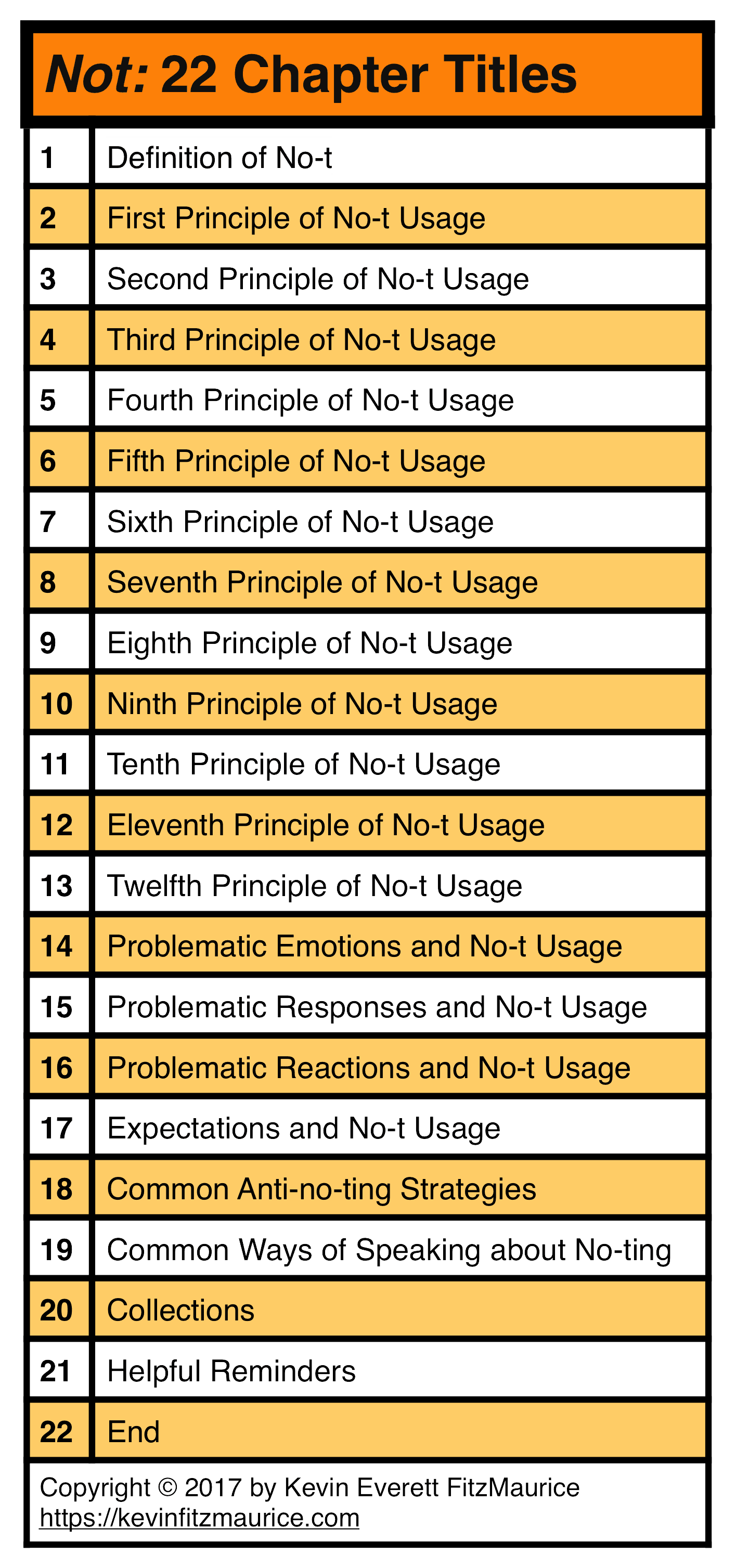No-ting NotesNotes ListedChapter Contents for NOTMore Notes6 Groups of Topics10 Skills & Topics
No-ting Notes for: NOT (Don’t Read This!)
- Garden will teach you an easy and effective system of Cognitive Behavioral Therapy (CBT & REBT).
- REBT practitioners update their practice for greater effectiveness & efficiency with Not.
- Ego will help you to live sane in an insane world of competing ego stories.
“No-ting can be understood as a reverse expectation.” —Kevin Everett FitzMaurice
- Read and discover how making one semantic error causes countless accidents, blunders, errors, and mistakes.
NotES ORGANIZED ALPHABETICALLY
- Acceptance ends no-ting.
- Adults are lost in no-ting.
- All active psychological controls are no-ting.
- Because of tasting something to be sour, bitter, or harsh, you switch, not because of rules or no-ting.
- Being in the present moment ends no-ting.
- Control is no-ting.
- Coping never uses no-ting.
- Double payoffs exist for no-ting because you can both know better by knowing what should have been and know better by knowing what should be.
- Dull thinking can be a result of needing a place of escape from the problem of no-ting about no-ting. You channel nothing so can do and understand nothing: safe from the knowing no-ting.
- Ego does not care about anything, but feeding itself pride and avoiding eating shame and no-ting is pride.
- Ego loves no-ting because it results in pride; therefore, ego ignores all the other results of no-ting, which are only negative for your life.
- Ego wants to keep no-ting forever since it is ego candy, and nothing tastes better to the ego.
- Focus on doing good, not stopping bad. This is one way to avoid no-ting.
- How is the quality and depth of your experience, pleasure, sensations, sensing, etc., without and with no-ting?
- If something is wrong or goes wrong, then look for the no-ting that is causing the problem.
- Instead of no-ting: redirect, reduce, refocus, switch.
- Is no-ting a thing, a beast, or just a process?
- Is no-ting the most important thing for you?
- Is no-ting your god?
- It rarely works to fight fire with fire; for example, it does not work to fight no-ting with no-ting.
- Letting things go ends no-ting.
- Much of coping is only a practice of ways to escape no-ting.
- Much of problem-solving is simply looking for ways to overcome no-ting.
- Notice how much causes, movements, and politics focuses on no-ting.
- Notice how much of adult conversation is focused on no-ting.
- Notice how much of family, friendship, and romantic bonding is based on shared no-ting.
- No-ting attacks multiply, serve, increase, spread, encourage the negative.
- No-ting for actions and procedures is failing.
- No-ting for rules and policies can be useful.
- No-ting in the abstract, imagination, or theory can be useful.
- No-ting in the practical and procedural is a disaster.
- No-ting is always wrong.
- No-ting is an issue that brings up all other issues.
- No-ting is destroying.
- No-ting is failing.
- No-ting is impossible to do.
- No-ting is okay as an abstraction.
- No-ting is part of suffering, whining, blaming, damning, lying, etc.
- No-ting is self-defeating, self-sabotaging, self-destructive, goal destroying, and results destroying.
- No-ting is the enemy.
- No-ting is the opposite of the nature we were given: transceiving.
- No-ting is to do nothing.
- No-ting is whining.
- No-ting no-ting is a complete failure.
- No-ting provides an illusion of power and control and so pride.
- No-ting puts you in touch with and increases the negative.
- Not how you feel about no-ting, but how you experience it will help you see it for what it is.
- Peace is anti-no-ting.
- Pride payoffs motivate no-ting to continue despite it delivering the opposite results of those that are desired.
- Problem-solving is never successful with no-ting.
- Recognize no-ting by negative vibrations, patterns, energy waves, rhythms, negative sine waves, negative energies, and negative cycles.
- See how many seconds, then minutes, then hours, then days you can go without no-ting.
- Since self has three parts (heart, soul, mind), you can give one part to being no-ting.
- Surrender ends no-thing; therefore, surrender allows a return to clarity and simplicity.
- Surrender ends no-ting through unconditional acceptance and an end to trying.
- Test the results of no-ting and learn for yourself.
- The mind becomes no-ting.
- The only no-ting available is nothing.
- We hate no-ting when it is turned against us, but love it when we can turn it against others.
- We prefer no-ting to love, peace, kindness, happiness, peace, success, and relationships.
- We want things to fail so we can no-t them and other people.
- What are you intending, wanting, wishing for, desiring, and emotionally seeking when you are no-ting?
- What is your motivation for no-ting since its results are always bad?
- When are you going to hold no-ting responsible?
- When are you going to track the results of no-ting?
- When things fail, we get to have no-ting about what should have been and no-ting about what should be; therefore, we are motivated to sabotage.
- Who and what do you sacrifice to your lust for no-ting?
- Why are there pride payoffs, and why is no-ting a pride payoff?
- Why do we prefer no-ting despite its horrible results?
- Why do you blame the signals for repeating that no-ting causes to repeat?
- Why do you blame the signals that no-ting interferes with for the interference?
- Why do you want to practice no-ting so badly?
- Why does no-ting exist?
- Why don’t you see no-thing as affecting that which it is used upon?
- Why insist on changing using no-ting when it cannot work?
- Why is there ego, and why does it love no-ting?
- Why no-ting?
- Why try to change signals or channels when you cannot?
- You do the opposite of what you want to do when you try to do with no-ting.
- Read and discover how making one semantic error causes countless accidents, blunders, errors, and mistakes.
22 Chapters for the book Not (Don’t Read This!)
- Click to go to the book.
- Read and discover how making one semantic error causes countless accidents, blunders, errors, and mistakes.
DISPUTE NO-TING
- Energy: What kind of energy or power is it using, and does it increase?
- Sensation: What kind of experiences does it result in and seek?
- Mind: What kind of thinking does it exist on and promote?
- Social: What are the effects on your relationships?
- Work: Does it hinder your creativity and productivity at school or work?
Notes on the Topic of Should-Be Becomes Should-Not-Be
- The should-be is what should-not-be because it is reasoned that what should-not-be should not exist in the future, and the should-be is the future, so what should-be is not the what should-not-be.
- If that sounds confusing, it is because it is twisted logic.
“What shall we say then? Is the law sin? God forbid. Nay, I had not known sin, but by the law: for I had not known lust, except the law had said, Thou shalt not covet.” —Romans 7:7
“For that which I do I allow not: for what I would, that do I not; but what I hate, that do I.” —Romans 7:15
“I find then a law, that, when I would do good, evil is present with me.” —Romans 7:21
3D: Daily Dose: 2017
#Don’t #Don’t: 2017-05-27
- You cannot do something that does not exist; therefore, stop telling yourself not to do something, because that leaves you no choice but to do it.
- You cannot do something that does not exist; therefore, stop telling yourself not to forget something, because that leaves you no choice but to forget it.
- You cannot think something that does not exist; therefore, stop telling yourself not to think something, because that leaves you no choice but to think it.
- When you demand that you do not do something, you are demanding that you do “not” or nothing; therefore, your pressure to do must release on the only thing available: doing that which you do not want to do.
- You can use “do not” for information, facts, knowledge, and rules; but refrain from using “do not” for actions, behaviors, directions, practices, and procedures.
3D: Daily Dose: 2020
#No-ting #Shoulding: 2020-04-18
- You will fail when your mind is on losing-the-game and on not-losing-the-game because both are losing positions.
- You will often fail when your mind is on “I should win” and on “I should not lose” because “I should not lose” will often dominate “I should win.”
- When your focus is on not failing (I should not fail), then you are predicting and preparing for failure.
- When your focus is on not being a failure (I should not be a failure), then you are working to produce and perfect a failure.
- When your mind is on “I should win” as an active positive-position and on “I should not lose” as an active negative-position, then if you can keep the positive position stronger than the negative position, you will win.
#No-ting #Should-Not: 2020-04-24
- When you think something should-not-have-been, then you do not accept the past, are in conflict with the past, want to control what you cannot control, make the past appear worse than it was, often whine and blame, and increase and spread emotional stress.
- When you think something should-not-be, then you do not accept the present, are in conflict with the present, want to control what you cannot control, make the present appear worse than it is, often whine and blame, and increase and spread emotional stress.
- When you think something will-not-be what it should-be, then you do not accept the future, are in conflict with the future, want to control what you cannot control, make the future appear worse than it might be, often whine and blame, and increase and spread emotional stress.
- Coping with the past, present, and future always begins with acceptance (it is what it is), and then moves on to problem-solving, fixing, and planning what you have or can get the authority and power to improve, fix, or prepare for.
- Look out for any no-ting (should-not) because no-ting is anti-reality and will keep you sidetracked from productively improving what you can improve, moving on to new experiences, planing for the future, and proactively preparing for problems.
- REBT practitioners update their practice for greater effectiveness & efficiency with Not.
- Read and master the life skill of acceptance using the best combination of CBT, REBT, & Stoicism.
- Read and discover how making one semantic error causes countless accidents, blunders, errors, and mistakes.
6 Groups of Topics Menu
- 1. Pages by Topic
- 2. Fast-Facts by Topic
- 3. Quotations by Topic
- 4. Poems by Topic
- 5. Scripture by Topic
- 6. Websites by Topic
- Read and discover how CBT, REBT, & Stoicism evolved into one system. Notes on the Topic of No-Ting Related to the Book NOT
- Read for the best breathing exercises for your feelings and stress. Notes on the Topic of No-Ting Related to the Book NOT
- Read and discover how making one semantic error causes countless accidents, blunders, errors, and mistakes. Notes on the Topic of No-Ting Related to the Book NOT
9 Skills & Topics Menu
- 1. Anger Skills & Topics
- 2. Blame Skills & Topics
- 3. Communication Skills & Topics
- 4. Coping Skills & Topics
- 5. Counseling Skills & Topics
- 6. Praying Skills & Topics
- 7. Recovery Skills & Topics
- 8. Responsibility Skills & Topics
- 9. Thinking Skills & Topics
- Read and discover how CBT, REBT, & Stoicism evolved into one system. Notes on the Topic of No-Ting Related to the Book NOT
- Read for the best breathing exercises for your feelings and stress. Notes on the Topic of No-Ting Related to the Book NOT
- Read and discover how making one semantic error causes countless accidents, blunders, errors, and mistakes. Notes on the Topic of No-Ting Related to the Book NOT




